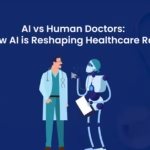Artificial Intelligence (AI) is no longer a futuristic concept confined to sci-fi movies; it’s rapidly transforming industries, and healthcare is at the forefront of this revolution. From streamlining administrative tasks to assisting in life-saving diagnoses, AI is poised to redefine how we experience and deliver healthcare.
The Dawn of a Smarter Healthcare Era
Imagine a world where diseases are detected earlier, treatments are personalized with unprecedented precision, and administrative burdens on healthcare professionals are significantly reduced. This isn’t a distant dream; it’s the reality AI is actively building.
Currently, AI is making its mark in several key areas:
- Enhanced Diagnostics: AI algorithms can analyze vast amounts of medical imaging data (X-rays, MRIs, CT scans) with incredible speed and accuracy, often identifying subtle patterns that human eyes might miss. This leads to earlier and more precise diagnoses for conditions like cancer, heart disease, and neurological disorders.
- Personalized Treatment Plans: By crunching through a patient’s unique medical history, genetic information, lifestyle, and even environmental factors, AI can help doctors craft highly individualized treatment plans. This moves us closer to “precision medicine,” where therapies are tailored to maximize effectiveness and minimize side effects.
- Drug Discovery and Development: The process of bringing a new drug to market is incredibly long and expensive. AI is accelerating this by rapidly identifying potential drug candidates, predicting their efficacy, and even optimizing clinical trial design, leading to faster breakthroughs.
- Streamlined Operations and Administration: From automating patient scheduling and billing to managing electronic health records (EHRs) and predicting workforce needs, AI is freeing up healthcare professionals from time-consuming administrative tasks, allowing them to focus more on patient care.
- Virtual Assistants and Remote Monitoring: AI-powered virtual assistants are improving patient engagement by answering common questions, providing appointment reminders, and offering initial symptom assessments. Remote monitoring tools, using AI to analyze data from wearables and smart devices, enable continuous tracking of vital signs and early detection of potential health issues.
The Promise of a Healthier Future
The benefits of integrating AI into healthcare are profound. We’re looking at:
- Improved Patient Outcomes: Earlier diagnoses, more effective treatments, and proactive interventions can lead to significantly better health outcomes for patients.
- Increased Efficiency and Reduced Costs: Automating repetitive tasks and optimizing processes can reduce operational costs for healthcare providers, potentially making healthcare more affordable and accessible.
- Empowered Healthcare Professionals: AI acts as a powerful assistant, augmenting human intelligence and allowing doctors, nurses, and researchers to make more informed decisions and dedicate more time to complex cases and patient interaction.
- Greater Accessibility: AI-powered tools can help bridge gaps in healthcare access, particularly in remote areas or for underserved populations, through telehealth and remote monitoring.
Navigating the Challenges and Ethical Landscape
While the potential of AI in healthcare is immense, it’s crucial to acknowledge and address the challenges:
- Data Privacy and Security: AI systems rely on vast amounts of sensitive patient data, raising critical concerns about privacy, data breaches, and misuse. Robust security measures and strict regulatory frameworks are paramount.
- Algorithmic Bias: If AI models are trained on biased datasets (e.g., data predominantly from one demographic group), they can perpetuate and even amplify existing health disparities. Ensuring diverse and representative datasets is crucial for equitable outcomes.
- Transparency and Trust: The “black box” nature of some AI algorithms can make it difficult to understand how they arrive at their decisions. Building trust among patients and clinicians requires greater transparency and explainability in AI models.
- Integration with Existing Systems: Healthcare systems are complex. Seamlessly integrating new AI technologies into existing workflows and electronic health records can be a significant hurdle.
- Regulatory Frameworks: As AI rapidly evolves, regulatory bodies are working to keep pace, ensuring the safety, effectiveness, and ethical use of AI-powered medical devices and solutions.
- Human Oversight and Accountability: While AI can assist, human oversight remains critical. Questions around liability when an AI makes an error, and the need for medical professionals to retain ultimate decision-making authority, are vital considerations.
The Road Ahead: A Collaborative Journey
The future of AI in healthcare is not about replacing human expertise, but augmenting it. It’s about a collaborative journey where technology empowers healthcare professionals to deliver better, more efficient, and more personalized care. As AI continues to mature, we can expect:
- Further advancements in personalized medicine, including “digital twins” that simulate individual patient responses to treatments.
- More sophisticated AI assistants that can engage in complex conversations and provide deeper insights.
- Robotics in surgery with enhanced precision and remote capabilities.
- AI-driven public health initiatives for disease prediction and prevention on a larger scale.
The integration of AI into healthcare is a transformative force, promising a healthier, more efficient, and more equitable future for all. By responsibly addressing the challenges and fostering collaboration between technology developers, healthcare providers, and policymakers, we can unlock the full potential of AI to revolutionize human well-being.



thc chocolates usa delivery with premium quality